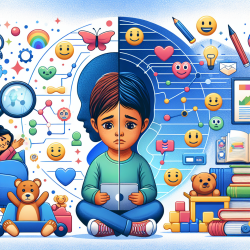Introduction
As practitioners dedicated to improving children's lives, we understand the importance of using validated tools to assess and enhance health-related quality of life (HRQOL). The study "Validation of the Korean version of the Pediatric Quality of Life Inventory™ 4.0 (PedsQL™) Generic Core Scales in school children and adolescents using the Rasch model" provides valuable insights into the application of PedsQL™ in diverse cultural contexts. This blog will explore how the findings from this study can inform and improve your practice, particularly in the context of providing online therapy services to schools.
Understanding PedsQL™ and Its Validation
The Pediatric Quality of Life Inventory™ (PedsQL™) is a robust tool used to measure HRQOL in children and adolescents. The Korean version's validation study utilized the Rasch model, a sophisticated statistical approach that enhances the precision of measurement by considering item difficulty and person ability separately. This study demonstrated the feasibility, validity, and reliability of the Korean PedsQL™ for school populations, highlighting its potential for broader application.
Key Findings and Their Implications
- Feasibility and Validity: The study confirmed the PedsQL™'s feasibility and validity in Korean school settings, aligning with previous validations in other languages. This underscores the tool's adaptability across cultures, making it a reliable choice for practitioners working in diverse environments.
- Person and Item Reliability: The study found high item reliability but noted low person reliability, suggesting a narrow spread of the sample. Practitioners should consider this when interpreting results, especially in healthy populations where ceiling effects may occur.
- Parent-Child Agreement: Moderate agreement between child self-reports and parent proxy-reports was observed, with higher consistency in older children. This highlights the importance of incorporating both perspectives in HRQOL assessments.
Practical Applications for Practitioners
For practitioners providing online therapy services to schools, integrating PedsQL™ into assessments can offer a comprehensive view of a child's HRQOL. Here are some practical steps to enhance your practice:
- Utilize PedsQL™ for Baseline Assessments: Implement PedsQL™ as a standard tool for initial assessments to establish a baseline of children's HRQOL. This can guide therapy goals and measure progress over time.
- Consider Cultural Contexts: When working with diverse populations, be mindful of cultural differences that may affect responses. Use the PedsQL™'s validated translations to ensure accurate assessments.
- Engage Parents in the Process: Encourage parent involvement by using proxy-reports alongside child self-reports. This dual perspective can provide a more holistic understanding of the child's quality of life.
- Address Ceiling Effects: In predominantly healthy populations, be aware of potential ceiling effects. Consider supplementing PedsQL™ with additional measures that capture positive aspects of well-being.
Encouraging Further Research
The study's findings also highlight areas for further research, particularly in understanding cultural nuances and improving person reliability in healthy populations. Practitioners are encouraged to contribute to this body of research by exploring these areas in their practice settings.
Conclusion
The validation of the Korean PedsQL™ underscores the importance of culturally sensitive tools in assessing pediatric quality of life. By integrating these findings into your practice, you can enhance your ability to make data-driven decisions that improve outcomes for children. To read the original research paper, please follow this link: Validation of the Korean version of the pediatric quality of life inventory™ 4.0 (PedsQL™) generic core scales in school children and adolescents using the rasch model.










